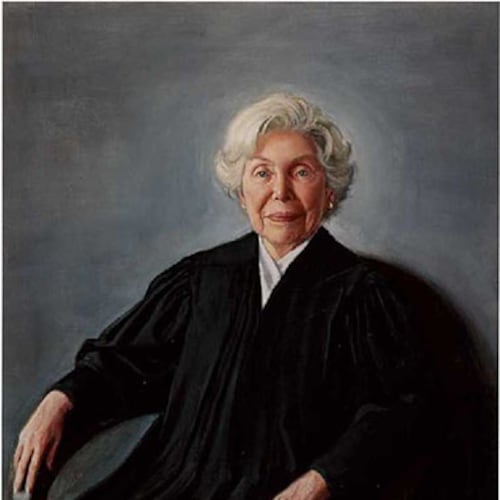A lawyer for the popular "Undisclosed" podcast on Monday asked the state's highest court to allow the podcast to copy a court stenographer's audio recording of a 2001 murder trial in Floyd County.
The podcast is appealing a judge's ruling that allowed it to only listen, but
Credit: Bill Rankin
Credit: Bill Rankin
not copy, the recorded trial testimony of Joey Watkins, who is serving a life sentence for the murder of Isaac Dawkins. Undisclosed's second season raised questions as to whether Watkins in fact committed the crime. The Georgia Innocence Project is now pursuing a motion for a new trial on Watkin's behalf.
During oral arguments on Monday, a number of justices questioned Atlanta lawyer James Cobb, who represents Undisclosed, whether the podcast pursued the correct legal avenue to obtain the recordings, particularly in light of the fact the case was closed a number of years ago. They also questioned whether a court reporter's audio is an official court record that can be recorded and used for a podcast.
Credit: Bill Rankin
Credit: Bill Rankin
"There is a common law right of access that doesn't end with the conclusion of the case," Cobb told the court. He also maintained that the audio recordings are court records and can be copied unless there is a showing that a compelling private interest outweighs the public interest. No such finding has been made in this case, he added.
Rome County Assistant District Attorney John F. McClellan disagreed.
"That case was over with, done with," he said, adding the trial court no longer had jurisdiction to consider a request seeking access to the court reporter's audio.
Credit: Bill Rankin
Credit: Bill Rankin
A court reporter's transcript of the trial is the official court record of the proceeding, he argued. As for the stenographer's recording, which is often used as a backup, "It's never been accorded the status of being an official court record."
But under questioning by Justice Nels Peterson, McClellan conceded that Georgia common law would grant the right to both inspect and copy the audio recordings if they are deemed subject to disclosure.
Justice Robert Benham asked McClellan to explain "the downside" of the court ruling that the audio recordings can be accessed and copied.
"There has to been some closure brought to criminal cases," McClellan answered.
But Peterson noted that a podcast about a past criminal case doesn't affect its finality.
Credit: Bill Rankin
Credit: Bill Rankin
Justice David Nahmias said he wasn't buying the prosecutor's explanation, because the news media could, as is often done, use the official court transcript to report about a past criminal case.
"So what's the harm?" Nahmias asked.
"I don't know if there's a practical harm, your honor," McClellan conceded.
The state high court will issue its ruling in the coming months. It is already considering the issue in a similar case brought by the Merchant Law Firm against Douglas County Chief Judge David Emerson and his court reporter.
The lawsuit stems from cases tried before Emerson in 2015 by Marietta criminal defense attorney Ashleigh Merchant. She is seeking the audio recordings because she said Emerson became angry and hostile toward her and addressed her in a condescending manner.
Credit: Bill Rankin
Credit: Bill Rankin
The court's decisions in either the Undisclosed or Merchant case could set a precedent as to whether a stenographer's audio recording of a court proceeding can be obtained by the public and the news media. Courtroom audio is particularly valuable to documentaries, such as podcasts.
The first season of The Atlanta Journal-Constitution's "Breakdown" podcast relied heavily on court reporters' recordings of a trial in Haralson County and a subsequent court hearing in Telfair County.
Judges in those two counties allowed the AJC to record the stenographers' audio of a trial and a post-conviction hearing in the case involving Justin Chapman. Chapman, who attended Monday's arguments, was initially convicted of arson and murder. After he was granted a new trial, prosecutors decided not to try Chapman again.
About the Author
The Latest
Featured







